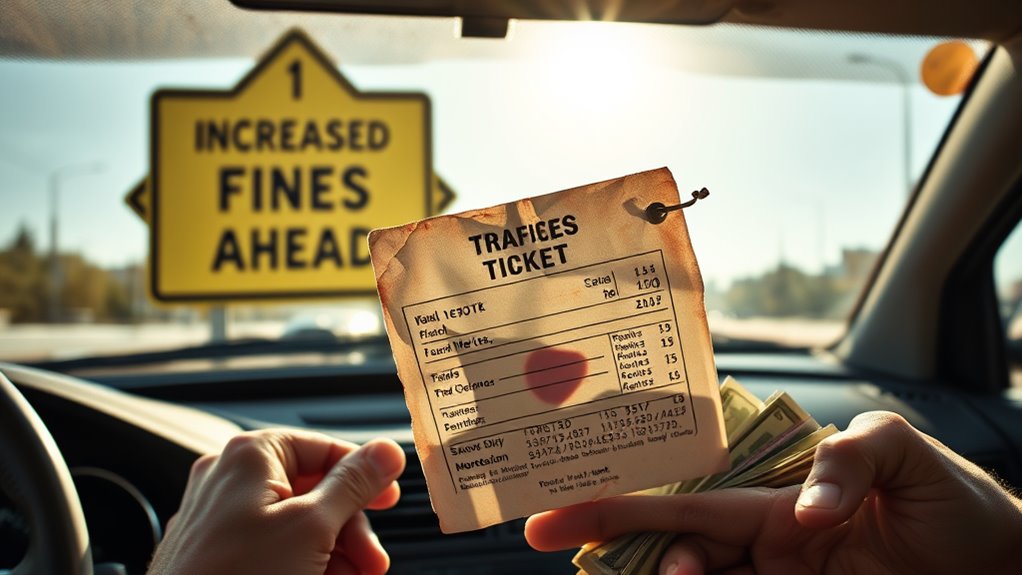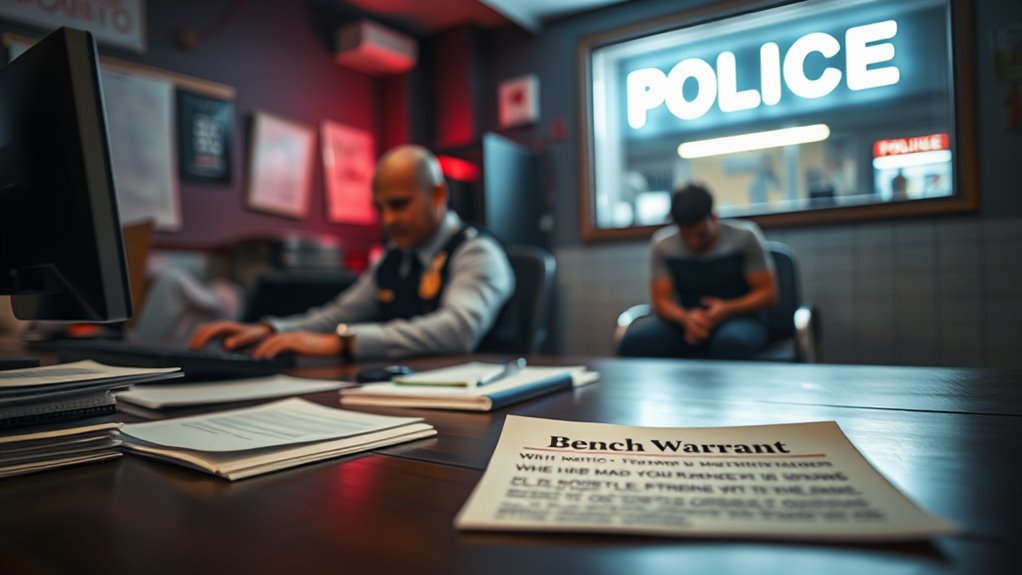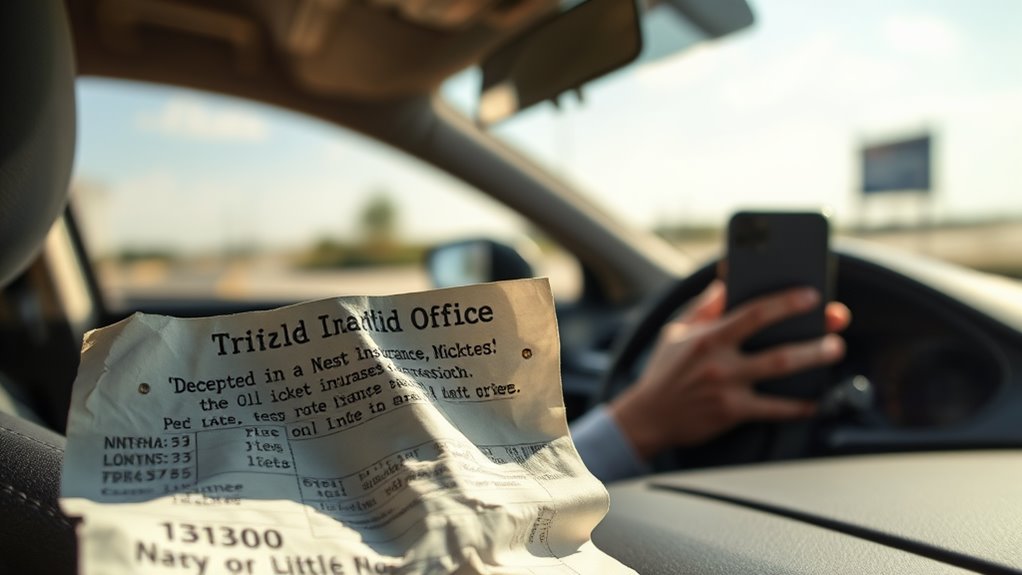If you've got unpaid traffic tickets in California, the repercussions can escalate quickly. Ignoring them might seem harmless at first, but that could lead to increased fines, license suspensions, and even bench warrants. These consequences can seriously impact your life, from job opportunities to financial stability. Understanding the full scope of what might happen next is vital for avoiding a downward spiral. What happens when these tickets go unresolved? Let's explore.
Key Takeaways
- Unpaid traffic tickets can lead to increased fines and penalties, accumulating costs over $1,000 due to late fees and civil assessments.
- Ignoring tickets may result in a registration hold, preventing the renewal or modification of vehicle registration until fines are paid.
- Failure to appear in court for unpaid tickets can lead to bench warrants, allowing law enforcement to arrest individuals at any time.
- A poor driving record from unpaid tickets can hinder job opportunities, especially in positions requiring driving responsibilities.
- Long-term financial consequences may arise, impacting credit scores and making it difficult to secure loans or mortgages.
Increased Fines and Fees
When you receive a traffic ticket in California, you might be surprised at how quickly the fines and fees can escalate. The base fine for speeding up to 15 mph over the limit starts at $35, but additional fees can skyrocket the total.
For example, a speeding ticket exceeding 26 mph can cost you $490 when fees are included. If you miss a payment, you risk incurring a $300 civil assessment fee. Late payments further inflate costs, potentially pushing your ticket over $1,000. This financial burden often impacts low-income households disproportionately, exacerbating existing financial challenges. Additionally, unpaid tickets can lead to significant debt accumulation, creating long-lasting economic instability for many individuals. To help alleviate this issue, the state has introduced an Ability-to-Pay Calculator designed to assist drivers with traffic fines and fees in California. Understanding the impact of unpaid tickets on your driving record can also help you navigate these challenges more effectively.
License Suspension
Unpaid traffic tickets can lead to severe repercussions, one of which is license suspension. While California previously allowed suspensions for unpaid fines, reforms in 2017 changed this practice.
Now, your license won't be suspended solely for not paying tickets, as Assembly Bill 103 abolished this authority. However, be aware that your license can still be suspended for failing to appear in court for traffic offenses, driving under the influence, or accumulating excessive points for infractions.
Non-compliance with court orders also poses risks. Driving with a suspended license can result in misdemeanor charges, fines, and even jail time.
It's essential to address any unpaid tickets promptly to avoid these serious consequences. Consider exploring payment plans or alternative options if you're facing financial difficulties.
Registration Hold
A registration hold can greatly impact your ability to manage your vehicle. If you have unpaid traffic tickets, this hold prevents you from renewing, replacing, or modifying your vehicle registration.
While there isn't a specific penalty fine for the hold itself, it often comes with additional fees tied to the unpaid tickets. To clear the hold, you'll typically need to pay your outstanding fines in full, though payment plans may be available.
Ignoring unpaid tickets can escalate into further complications, including referral to collections, civil assessments, or even wage garnishments. By addressing these issues promptly, you can avoid a registration hold and maintain your driving privileges without unnecessary stress.
Bench Warrants and Arrests
Failing to address unpaid traffic tickets can escalate into serious legal issues, including the issuance of bench warrants.
When a bench warrant is issued, it can lead to significant consequences:
- Arrest: Law enforcement can arrest you at any time, complicating your daily life.
- Increased fines: Ignoring the warrant could result in additional penalties, worsening your financial situation.
- Travel complications: Bench warrants can hinder travel plans, as they alert authorities and prevent leaving the country.
Clearing a bench warrant typically requires a court appearance or legal assistance.
Ignoring these warrants only prolongs your legal troubles, leading to more stress and complications down the line.
Addressing your unpaid tickets promptly can help you avoid these serious repercussions.
Potential Jail Time
When you ignore traffic tickets, the consequences can escalate to the point of potential jail time, especially if you face a failure to appear charge. California law can impose up to six months in jail for this, with additional fines potentially reaching $1,000.
The severity of your initial offense influences the outcome; for instance, a DUI can lead to more serious penalties. The California Vehicle Code outlines these repercussions, indicating that fines can quickly accumulate, even for minor infractions.
Misdemeanor Charges
Ignoring traffic tickets can lead to misdemeanor charges, which carry serious implications beyond just the unpaid fines. When you fail to appear in court, it's not merely about the ticket; you risk facing contempt of court charges.
Here are some potential consequences:
- Fines: You could incur fines up to $1,000.
- Jail Time: There's a possibility of facing up to six months in jail.
- Warrants: A bench warrant may be issued, jeopardizing your freedom.
Legal representation is essential in these situations. Ignoring the issue only escalates penalties and complicates your life further.
Addressing your tickets promptly can help you avoid these serious repercussions.
Impact on Insurance Rates
Unpaid traffic tickets can considerably impact your insurance rates, as insurers view these violations as indicators of increased risk.
If you don't pay a red-light ticket within 30 days, it can lead to significant premium increases, often reflecting a higher likelihood of accidents.
Insurance companies assess your driving history, including the severity and frequency of violations, which means even minor offenses can hike your rates by around 40%.
Unpaid fines can also result in additional penalties, making your driving record more visible to insurers.
While some violations, like red-light tickets, are less severe than DUIs, they still carry weight.
To mitigate these effects, you should promptly pay fines or contest tickets to avoid lasting financial repercussions.
Vehicle Impoundment
Failing to address unpaid traffic tickets can lead to severe consequences, including vehicle impoundment.
Ignoring unpaid traffic tickets can result in serious repercussions, such as having your vehicle impounded.
When your vehicle is impounded, it can greatly disrupt your daily routine. Here are three key points to take into account:
- Legal Authority: California law allows law enforcement to impound vehicles if they're driven with a suspended license or other violations.
- Costs: Recovering your vehicle involves hefty towing and storage fees, in addition to any outstanding fines.
- Consequences: If you don't retrieve your vehicle, it may be sold at auction, compounding your financial difficulties.
Addressing unpaid tickets promptly can help you avoid these challenges and keep your vehicle secure.
Take action before vehicle impoundment becomes a reality.
Administrative Burdens
As traffic ticket fees continue to rise, many Californians find themselves facing administrative burdens that complicate their financial situations.
The complex processes surrounding traffic fines, including potential license suspensions and additional fees, can overwhelm those already struggling financially. Inconsistent ability-to-pay assessments across courts create confusion, while the introduction of an ability-to-pay calculator aims to streamline this experience.
However, until it's fully implemented statewide, disparities persist. The reliance on revenue from fines further exacerbates this issue, disproportionately impacting low-income communities.
As administrative costs mount, the entire system becomes a cycle of debt, making it essential for Californians to navigate these burdens carefully to avoid escalating financial strain.
Long-term Financial Consequences
While maneuvering through the complexities of traffic fines, you may not realize the long-term financial consequences that can follow.
These consequences can greatly impact your financial stability:
- Increased Insurance Costs: Points on your record can lead to higher premiums, with costs potentially amounting to thousands over time.
- Career Implications: A tarnished driving record can jeopardize job opportunities, especially in roles requiring driving, as employers often check these records.
- Debt Accumulation: Unpaid tickets incur additional late fees and penalties, with total costs sometimes exceeding $1,000, causing financial strain.
Being aware of these long-term effects can help you make informed decisions about managing traffic fines and their implications on your finances.
Conclusion
In California, ignoring unpaid traffic tickets might seem like a harmless choice, but it ironically sets off a chain reaction that complicates your life. You might think you're saving money by not paying, but escalating fines, potential jail time, and a tarnished record could cost you much more in the long run. So, while you're avoiding that ticket payment today, consider how much you could be sacrificing tomorrow. It's often cheaper and easier to resolve issues than to let them spiral out of control.




